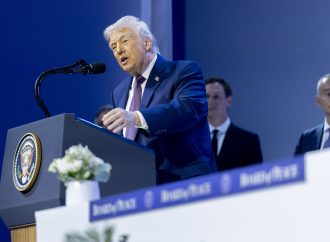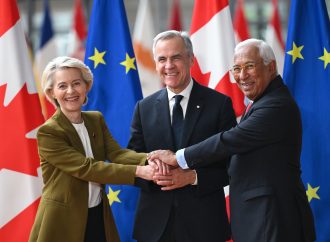By John Gruetzner and Geoffrey Ziebart
The appointment of former McKinsey executive, Domonic Barton, as Canada’s new ambassador to China presents a new opportunity to reset bilateral relations. However, while Barton is well-positioned to further Canadian interests in the world’s second-largest economy, he also faces a range of formidable challenges.
Dominic Barton‘s
appointment as Canada’s Ambassador to China, last month, creates an opportunity
to improve the quality of Canada’s engagement with the world’s second-largest
economy. His primary objectives should be to begin the long term process of
improving the capacity for Canada’s civil society, government agencies and the
private sector to engage with their Chinese counterparts.
Since 1970 Canada’s
bilateral relationship with China has been on autopilot; effectively
proceeding without adequate consideration of China’s rapidly evolving
characteristics. It is, therefore, time for Canada to make a shift from a
mostly passive, wishful thinking, mindset to a more activist approach.
Ambassador Barton – a former Global Managing Director at McKinsey – is well-positioned to develop the kind of data-driven framework necessary to gauge progress accurately.
Beginning with the commercial sphere, where Ambassador
Barton – a former Global Managing Director at McKinsey – is well-positioned to develop
the kind of data-driven framework necessary to gauge progress accurately. This
should be the first step towards creating a national blueprint for engaging
China and achieving Canada’s economic and security objectives.
To date, Canada’s China strategy has been conceptualized
through the lens of high-level political science analysis and has overlooked
the more tactical level expertise found, for instance, in business schools. And
so, another critical step for Canada will be to engage more technical
specialists in the research process. More granular-level information, coupled
with empirical research from in-country experts, will inform public and/or
private sector strategy more fully.
This reform can be achieved simply by amending Treasury
Board guidelines, so research on China – indeed, on all global markets –
includes local input from Canadian missions and other local experts.
Further, a range of other policy changes is also worth considering,
including:
- pushing Canadian commercial banks to support Canadian companies in China further;
- broadening the scope of Export Development Corporation (EDC) products for China; and
- determining whether it would be valuable for the Business Development Bank of Canada (BDC) to establish regional offices that can service Canadian exporters in China and other international markets.
And given that Canada is rapidly moving forward as an
export-oriented economy, particularly in the field of fashion, sporting goods
and luxury products, Ottawa might also explore creative initiatives such as a
private-public partnership to establish Canada-centric solutions to sell
Canada’s growing capacity in the luxury, sporting and consumer goods sectors.
Recommended: 30 Years After Tiananmen: Democracy More Urgent than Ever
As a non-career diplomat, Barton may bring a fresh
approach to the job. Ideally, this will mean a willingness to work with a broad
spectrum of corporate, government and civil society stakeholders. Such an
approach must still respect the role of the Chinese Ministry of Foreign Affairs
(MFA); mitigate the impact of competing press releases between both MFA and
Global Affairs Canada; but, most importantly, engage directly with industry
stakeholders in China that share an interest in successful cooperation with
Canada.
A broader approach should also encourage Canadian
executives to focus on their companies’ profitable growth by moving beyond
government protocol and, instead, viewing the China market as a large body of
customers that need to be convinced on the fundamentals of price, quality and
service.
The focus on protocol may have been a successful
“Team Canada” strategy in the mid-1990s, but it is no longer anywhere
near as relevant today. In the meantime, Chinese companies have grown
tremendously and are now competing fiercely around the globe. For Canadian
companies, this presents both a challenge to meet and an opportunity to grasp.
But since Federal and Provincial governments still provide a significant
proportion of Canada’s human resources in China, though they may provide
valuable initial bridges to the market, it is time for many businesses to move
from the infrequent trade mission stage to operating, full-time, on the ground
in China.
The focus on protocol may have been a successful “Team Canada” strategy in the mid-1990s, but it is no longer anywhere near as relevant today.
Beyond business, civil society engagement might be
strengthened by providing funds to qualified NGOs, either in China or Canada,
that work in politically non-sensitive areas. At the same time, the viability
of an Open Canada Grant Program, funded via the International Development
Research Centre (IDRC), or other NGO channels that improve civil society and
increase political pluralism should be reconsidered. These channels are more
responsive, flexible and less politically sensitive than using government
channels.
There is at present, however, a significant impediment to
further development of the Canada-China relationship: the case of Meng Wanzhou, the CFO of
Huawei, one of the world’s top telecoms equipment firms, who was detained by
Canadian authorities pursuant to an extradition request from the US. Ambassador
Barton will have his work cut out here, as he can only emphasize to Chinese
policymakers that Canada’s extradition treaties are administered through an
independent judicial system, that was designed to be immune to outside
pressure.
a significant impediment to further development of the Canada-China relationship: the case of Meng Wanzhou, the CFO of Huawei, one of the world’s top telecoms equipment firms, who was detained by Canadian authorities pursuant to an extradition request from the US.
Similarly, concerning the rollout of Canada’s 5G networks, he can only
diplomatically reiterate that various national security considerations will
inform the extent of Huawei’s participation therein. At the same time, however,
as he weighs the negative impact of this case on his CFO, his company, and
China, hopefully, Huawei CEO Ren Zhengfei will encourage China’s government to
reduce diplomatic tensions.
China already understands the value that extradition can
bring to global justice, as well as the gains it derives it is own anti-corruption
efforts by supporting the integrity of the global banking transfer system (Meng
has been accused of bank fraud). So hopefully it will come to be realized that
an improved relationship with Canada – rather than ongoing tension – will
deliver the more significant benefits to the Chinese people.
If Canada is to stand by a multilateral rules-based
order, it is obligated to play zone defence with others that share this
commitment. Canada has learned over the years to push back on American exceptionalism.
It can and must learn over time how successfully to push back on Chinese
exceptionalism as well.
Canada and China have a moral obligation to overcome the
“freeze” recently articulated by China’s previous Ambassador and work
on important issues of common interest. McKinsey, in a recent report, points
out that China is responsible for 28% of global carbon emissions. Canada has
many leading technology companies in this space that can scale up to be
significant players in China if the right commercial strategy is undertaken.
Recommended: China, State Capitalism, and the Global Financial Order
Now that China’s
Vice Premier Hu has accepted the threat that Asian Swine Fever presents,
there is a potential role for Canada to assist in resolving the epidemic,
especially given that Canada is one of the world’s top three pork producers.
China plans to bury nuclear waste in Gansu; Ontario Power Generation has the
expertise to assist in this endeavour. These are merely some initial steps in
rebuilding the relationship. Beyond this are many broader issues for
cooperation including climate change; global debt levels; reform of the World
Trade Organization and assisting China so that its global procurement of
energy, minerals and commodities adheres to the best environmental practices.
Canada and China have recently both appointed new Ambassadors. For the sake of their respective citizens, we hope that both sides can find a constructive path forward. For his part, Ambassador Barton has some heavy lifting to do, both in China and in Canada, to bring about those changes necessary for success.
Geoffrey Ziebart is Chairman of the Ottawa-based China Policy Centre. He previously served in the Canadian Armed Forces, and has studied and worked in China for 25 years, the last 10 as Country President for a Fortune 1000 industrial manufacturer
John Gruetzner is one of the 24 founders of the China
Policy Centre. He has lived and worked in China for over 35 years and
serves on the Board of a number of start-up companies.









